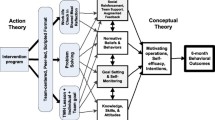Abstract
In this chapter, we examine barriers to providing sustainable health promotion and injury prevention programs in Northwest Territories (NWT), Canada. In the context of increasing healthcare costs in Canada, developing sustainable healthcare programs is especially relevant. Using a multiple case study methodology and a framework developed by Schell et al. (Implement Sci 8(15): 1–9, 2013), we evaluate the sustainability of two health promotion and injury prevention programs: Elders in Motion (EIM) and the NWT Aquatics Program. We apply Schell et al.’s (Implement Sci 8(15): 1–9, 2013) nine domains of capacity for sustainability to each program to illustrate the challenges of developing health programs in northern Canada. Our results suggest that largest barriers to sustainable health promotion and injury prevention programs in the NWT relate to program content and delivery, financial issues, and staffing. These findings can inform future health promotion and injury prevention strategies that are intended to improve health outcomes in northern Canada.
Access this chapter
Tax calculation will be finalised at checkout
Purchases are for personal use only
Similar content being viewed by others
References
Braun, V., & Clarke, V. (2006). Using thematic analysis in psychology. Qualitative Research in Psychology, 3(1), 77–101.
Canadian Centre for Activity and Aging [CCAA]. (n.d). Elders in motion: Active living exercise program in the NWT. London: Author.
Canadian Institute for Health Information. (2013). National health expenditure trends: 1975 to 2013. Retrieved from https://secure.cihi.ca/free_products/NHEXTrendsReport_EN.pdf
Canadian Red Coss. (2013). Analytical report on Aboriginal open water fatalities: Promising practices for prevention. Ottawa: Author.
Caseñas, C., & Kalsbeek, K. (2006, May). Archival research tutorial. Retrieved from http://www.library.ubc.ca/spcoll/Guides_UBC/Index.html
Education, Culture and Employment. (2015). Official languages. Retrieved from http://www.ece.gov.nt.ca/official-languages
Giles, A. R., Baker, A. C., & Rousell, D. D. (2007). Diving beneath the surface: The NWT Aquatics Program and implications for Aboriginal health. Pimatisiwin, 5(1), 25–49.
Giles, A. R., Strachan, S. M., Doucette, M. M., Stadig, G. S., & The Municipality of Pangnirtung. (2013). Using the vulnerability approach to understand aquatic-based risk and adaptation due to climate change in Pangnirtung, Nunavut. Arctic, 66(2), 207–217.
Health and Social Services. (2014). Caring for our people: Improving the Northwest Territories health and social services system. Yellowknife: Government of the NWT.
Hemenway, D., Aglipay, G. S., Helsing, K. L., & Raskob, G. E. (2006). Injury prevention and control research and training in accredited schools of public health: A CDC/ASPH assessment. Public Health Reports, 121(3), 349–351.
Municipal and Community Affairs. (n.d). NWT communities. Retrieved from http://www.maca.gov.nt.ca/?cmtylist=aklavik
Northwest Territories Recreation and Parks Association (NWTRPA). (n.d.). Elders in motion. Retrieved from http://nwtrpa.org/rpa/?page_id=55
NWTRPA. (2009). Elders in motion: A fitness program for seniors. Yellowknife: NWTRPA.
Schediac-Rizkallah, M. C., & Bone, L. R. (1998). Planning for the sustainability of community-based health programs: Conceptual frameworks and future directions for research, practice, and policy. Health Education Research, 13, 87–108.
Scheirer, M. A., & Dearing, J. M. (2011). An agenda for research on the sustainability of public health programs. American Journal of Public Health, 101, 2059–2067.
Schell, S. F., Luke, D. A., Schooley, M. W., Elliott, M. B., Herbers, S. H., Mueller, N. B., & Bunger, A. C. (2013). Public health program capacity for sustainability: A new framework. Implementation Science, 8(15), 1–9.
Stake, R. (2005). Qualitative case studies. In N. K. Denzin & Y. S. Lincoln (Eds.), The SAGE handbook of qualitative research (3rd ed., pp. 443–466). Thousand Oaks: Sage.
Szabo, C. (2002). NWT aquatics program summary. Yellowknife: Government of the Northwest Territories.
World Health Organization. (2015). Health topics: Health promotion. Retrieved from http://www.who.int/topics/health_promotion/en/
Author information
Authors and Affiliations
Corresponding author
Editor information
Editors and Affiliations
Rights and permissions
Copyright information
© 2017 Springer International Publishing Switzerland
About this chapter
Cite this chapter
Giles, A.R., Brooks-Cleator, L.A., Glass, C.T.R. (2017). Barriers to Sustainable Health Promotion and Injury Prevention in the Northwest Territories, Canada. In: Fondahl, G., Wilson, G. (eds) Northern Sustainabilities: Understanding and Addressing Change in the Circumpolar World. Springer Polar Sciences. Springer, Cham. https://doi.org/10.1007/978-3-319-46150-2_12
Download citation
DOI: https://doi.org/10.1007/978-3-319-46150-2_12
Published:
Publisher Name: Springer, Cham
Print ISBN: 978-3-319-46148-9
Online ISBN: 978-3-319-46150-2
eBook Packages: Earth and Environmental ScienceEarth and Environmental Science (R0)




